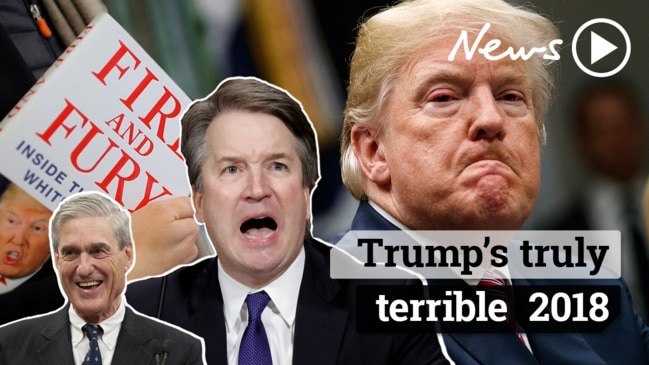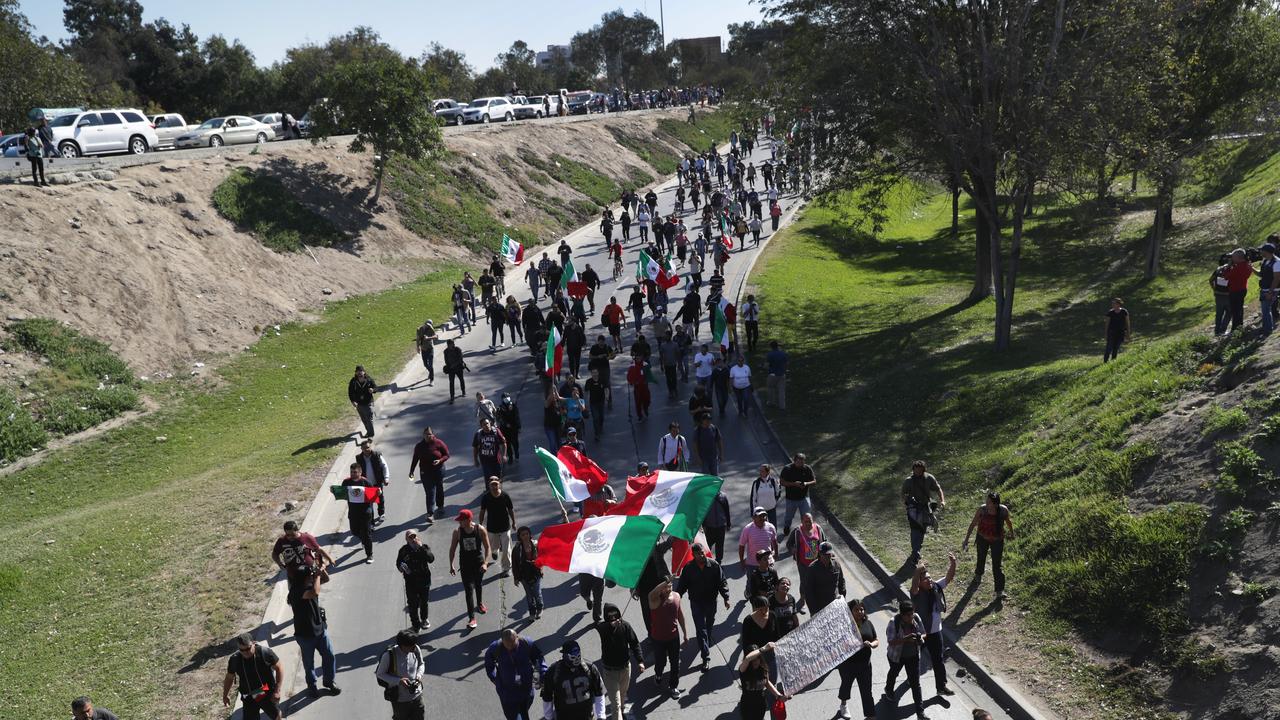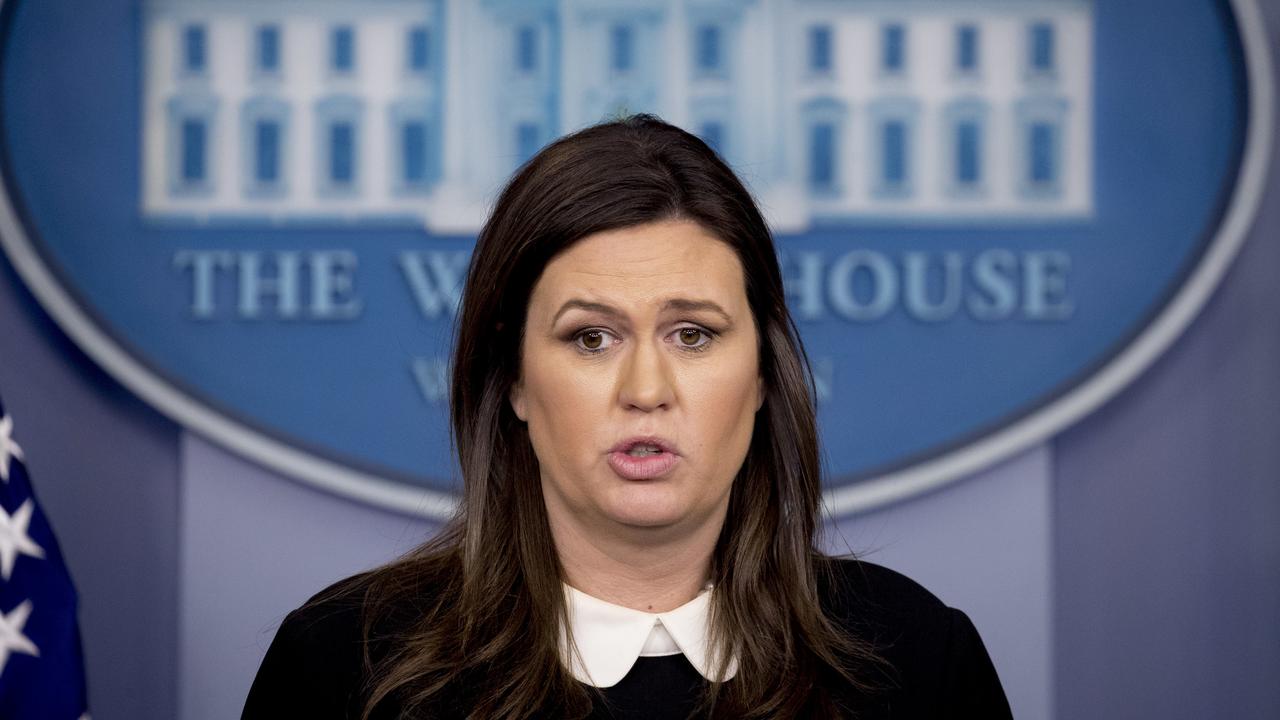How Donald Trump’s fight for the wall against Mexico could backfire
It was one of Donald Trump’s most significant promises, and helped him bag the election. But now it’s proving to be a massive thorn in his side.

Of all his campaign pledges, Donald Trump’s promise to build a wall on the southwestern US border stands out the most.
The American President’s political advisers believed this grand symbol — an enormous concrete wall worth billions of dollars that would keep undocumented South Americans out of the US — was the best way to get the President going hard on immigration.
At the time it worked.
“Build the wall!” became a trademark phrase among Mr Trump’s supporters, and he pushed the issue as part of a broader discussion about limiting immigration to the US.
But fast-forward two years into his presidency and Mr Trump’s obsession with the wall is backing him into a corner, according to a New York Times analysis.
The US leader is now threatening to declare a national emergency. At the same time, 800,000 federal government workers remain unpaid as the country enters its 16th day of a partial shutdown.
Top Democrats, who are now entering Congress, have already raised questions over whether the President can legally do this.
“Having spent more than four years — first as a candidate and then as President — whipping his core supporters into a frenzy over the idea of building a border wall, Mr Trump finds himself in a political box of his own making,” wrote the Times.
“In transforming the wall into a powerful emblem of his anti-immigration message, Mr Trump has made the proposal politically untouchable for Democrats, who have steadfastly refused to fund it, complicating the chances of any compromise.”
In other words, the core of his political campaign — the thing that helped get him elected — now threatens to screw him over.
TRUMP THREATENS EMERGENCY ORDER OVER WALL
Mr Trump is threatening to declare a national emergency over funding for the US-Mexico border wall.
The President has the power to declare such an emergency, but by definition, it refers to any occasion in which “federal assistance is needed to supplement state and local efforts and capabilities to save lives and to protect property and public health and safety, or to lessen or avert the threat of a catastrophe in any part of the United States”.
With Democrats controlling the Lower House now, the move would provide some fierce reaction from Mr Trump’s opponents, which could bring about a constitutional crisis.
The President is standing firm on his demand that Congress provide $US5.6 billion ($A7.9 billion) in funding for a wall on the US-Mexico border to bolster security and help control illegal immigration, human trafficking and the flow of illegal drugs.
“We have to build the wall or we have to build a barrier,” Mr Trump told reporters overnight.
“It’s a very important battle to win.”
A wall would end “99 per cent of our illegal border crossings” and will pay for itself many times in a year, he tweeted.
....The only reason they do not want to build a Wall is that Walls Work! 99% of our illegal Border crossings will end, crime in our Country will go way down and we will save billions of dollars a year! A properly planned and constructed Wall will pay for itself many times a year!
— Donald J. Trump (@realDonaldTrump) January 6, 2019
Democrats have refused to include funding for a wall in the spending bills.
“A wall is an immorality — it’s not who we are as a nation,” Speaker Nancy Pelosi said last week. “This is not a wall between Mexico and the United States that the President is creating here. It’s a wall between reality and his constituents, his supporters.”
The Democrats have argued that a wall is an expensive and ineffective way of dealing with illegal immigration, given that most undocumented immigrants overstay their visas, rather than cross the land border.
The chaotic back-and-forth has seen the President change his definition of what the wall actually is. Just last week he said: “I never said, ‘I’m going to build a concrete’ wall. I said I’m going to build a wall.”
The US is currently in the midst of a partial government shutdown — now into day 16. Several hundred thousand government employees are on leave without pay, while others are working but not receiving pay.
Mr Trump also said he was not happy with the situation.
“You think I like doing this? I don’t like doing this,” he told reporters, before boarding a helicopter for Camp David, the presidential retreat outside Washington.
He said he expected “very serious talks” early this week and that he “can relate” to federal workers impacted by the shutdown.
“I am sure that the people that are on the receiving end will make adjustment, they always do,” he said. He also claimed that many of the federal staff who are either at home or working without pay “agree 100 per cent with what I’m doing”.
“I may decide a national emergency depending on what happens over the next few days,” he added. “I have tremendous support within the Republican party.”

CAN TRUMP EVEN DO THIS?
Top Democrats have raised doubts whether Mr Trump can even declare a national emergency over the wall without facing legal and political challenges.
Adam Schiff, a Democratic leader on Capitol Hill, said the idea was “a non-starter”.
Speaking on CNN’s State of the Union overnight, the California representative said: “If Harry Truman couldn’t nationalise the steel industry during wartime, this President doesn’t have the power to declare an emergency and build a multi-billion dollar wall on the border. So that’s a non-starter.”
Likewise, Democratic Senator Dick Durbin warned the President that he would face legal challenges.
“I don’t know what he’s basing this on, but he’s faced so many lawsuits when he ignores the law and ignores tradition and precedent, and just goes forward without any concern,” he said on CBS’ Face the Nation overnight.
“He’ll face a challenge, I’m sure, if he oversteps what the law requires when it comes to his responsibility as commander-in-chief.”
House Armed Services Committee chairman Adam Smith said the executive power has been used to build military facilities in Iraq and Afghanistan, but would likely be “wide open” to a court challenge for the wall along the US-Mexico border.
“Where is the emergency?” the Washington Democrat said on ABC’s This Week.
Some Republicans have also indicated they’d rather Mr Trump didn’t do so.
SO WHO WILL PAY FOR THE WALL?
The fact remains that Mr Trump has anchored himself to this issue, and he’s apparently not willing to let go of it.
While the US Government remains in partial shutdown, questions remain over where the actual funding for the wall will come from.
Mr Trump wants Congress to take care of it, but Democrats are refusing to provide that.
It’s at odds with Mr Trump’s campaign promise that Mexico would pay for the wall — a claim he continues to spout.
Late last week, he tweeted again that Mexico was paying for the wall:
Mexico is paying for the Wall through the new USMCA Trade Deal. Much of the Wall has already been fully renovated or built. We have done a lot of work. $5.6 Billion Dollars that House has approved is very little in comparison to the benefits of National Security. Quick payback!
— Donald J. Trump (@realDonaldTrump) January 2, 2019
But according to fact-checking site PolitiFact, this is a lie.
The renegotiated United States-Mexico-Canada Agreement (USMCA) — through which Mr Trump claims Mexico is funding the wall — is not in effect yet and is still waiting on congressional approval, as well as approval from the legislative bodies of Canada and Mexico.
If approved, it’s unlikely the deal will come into effect until at least next year. And even if it does, there is nothing in the deal’s language that says Mexico will fund the wall.

Last month, White House press secretary Sarah Huckabee Sanders was quizzed over Mr Trump’s claim that the new trade deal would pay for the wall.
At a December press conference, a reporter asked where the additional funding for the wall would come from.
“The President has been clear that the USMCA deal would provide additional revenue through that deal that would show that Mexico was paying for the wall,” Ms Sanders responded.
“Not to the Treasury, though. The trade benefits, if there are any, don’t go to the Treasury,” the reporter responded.
“He’s saying that the revenue provided and the money that would be saved through the USMCA deal, we could pay for the wall four times over. And by doing that new trade deal, we have the opportunity to pay for the wall,” Ms Sanders said.
“But trade benefits go to private citizens. They don’t go the United States Treasury,” the reporter pointed out.
Ms Sanders said the President was referring to the overall revenue that would be raised from the deal.
But when asked if that meant the administration was going to tax, she said no. “No, we’re not taxing. We’re talking about additional revenue that wouldn’t have existed without the President getting a new deal.”



